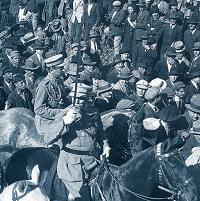
Artigo da revista time sobre salazar, em 1946:
Last week Portugal produced no big spot news ; it hadn't for 20 years ; it might not for 20 years more if the God he strove so hard to serve spared Antonio de Oliveira Salazar. For Salazar distrusted news. He suppressed and distorted it for the good of the Portuguese who, he believed, were unfit for facts. After 20 years of Salazar, the dean of Europe's dictators, Portugal was a melancholy land of impoverished, confused and frightened people. Even Salazar, that model of rectitude, showed signs of succumbing to a law of politics discovered by Lord Acton: "Power tends to corrupt; absolute power corrupts ab solutely."
The real news from Portugal was that another European dictatorship had failed, though it might hang on for years. In the way of dictatorships, it had stunned and shackled the wholesome forces that might have replaced it. Not only was Portugal at a new low point, it showed every sign of changing for the worse, perhaps slowly, perhaps by violent upheaval.
(...)
If Portuguese had felt boastful instead of wistful, there was material for self-congratulation about their Government and their way of life. Britain, their old ally, banker and protector, now owed them £80,000.000. Spain, their old rival, was in the United Nations' doghouse, while Salazar, in spite of his anti-democratic sympathies, had pursued throughout World War II a serpentine policy whose final tack was enough in the Allies' direction to earn their tolerance, if not their approval. The Portuguese national budget, thanks to Salazar, was always balanced these days. (It had shown a deficit in 68 of the 70 years before 1928.) Portugal's exports were much higher than before the war; her merchant marine was about to double its tonnage and her fishing fleet was expanding. Portugal's shop windows were full of luxury goods unobtainable in most of Europe. Her currency unit, the escudo, was steady at four U.S. cents.
(...)
Other modern dictators had been men so evil that their personalities obscured the inherent evil of dictatorship. Franco was a barrack-room bully, Mussolini a strutting iiar, Hitler a ranting sadist, and Stalin a bloody-minded professor of the art of power. But Salazar was a virtuous man—selfless, intelligent, efficient. If despotism could be benevolent, Salazar's character was ideal material for "the good dictator." Born at Santa Comba Dao, not far from Europe's second oldest university, in a typical pink-walled Portuguese Village, he had made such good marks in grade school that his peasant mother, whom he worshiped, called him "the little priest." He entered a seminary, but later decided he had no vocation for the priesthood and became an economics instructor at Coimbra University.
In 1926 he got a first unpalatable taste of politics. National finances were in chaos after 20 changes of government in five years. Salazar was invited to come to Lisbon to straighten them out. He took a look at the parliamentary confusion and, in deep disgust, demanded a free hand with the Treasury. Refused, he caught the next train back to the sedge-lined banks of the Mondego. He expressed his contempt for Lisbon's attempts at democracy and said that "one of the greatest mistakes of the 19th Century (which created the 'citizen'—an individual isolated from the family, the class, the cultural milieu, etc.) was to suppose that English . . . democracy was . . . capable of adaptation to all European peoples."
At the end of two years, continued chaos resolved itself into a government shakeup, and mild, aristocratic General Antonio Oscar de Fragoso Carmona became President. This besashed and epauletted figurehead (still President in name today) made Salazar Minister of Finance, with extraordinary powers, which he used to make himself dictator of the nation.
Salazar began immediately to construct his Estado Novo. He announced that the New State would be based on two great calls for social reform—the Rerum Novarum of Pope Leo XIII and the Quadragesima Anno of Pius XI (see RELIGION). But however lofty may have been his inspiration, Salazar's execution was on a quite different pattern, one already known and hated as Fascism: free thought was abolished, the individual became subordinated to the state, the human bill of rights was suppressed and the secret police became the main arm of government. Soon little boys, well-shod and sporting Balilla-like uniforms, were marching in the wake of Salazar's blackshirt-type Legido (Legion), which gave the stiff-arm salute and chanted: "Who leads? SALAZAR!"
The Quiet Life. It is doubtful if Salazar likes either the salute or the slogan. Unlike all other modern dictators, he hates parades, pomp or cheers. When he rides to ceremonies with President Carmona, the old soldier preens and beams; Salazar slinks back in the car, a scowl on his handsome face with the Savonarola-hard mouth. Asked why he refused to respond to cheers, Salazar gave a characteristic answer: "I could not flatter the people without being a traitor to my own conscience. Our regime is popular but it is not a government of the masses, being neither influenced nor directed by them. These good people who, moved by the excitement of the occasion, cheer me one day, may rise in rebellion the next day for equally passing reasons. . . .














1 comentário:
Há uma cena porreira do "Outro". Outros países tinham uns "El Chefe", um "duce", ou um "Mein Fuher" que basicamente eram uns gordos porcos, q passavam a vida a gritar da varanda do palacio la da terrinha. Nós tinhamos o Sr. Reitor...
Enviar um comentário